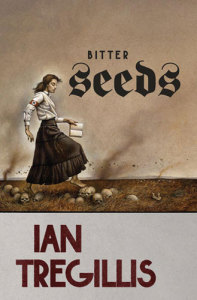
The Milkweed Triptych, by Ian Tregillis, comprises three novels: Bitter Seeds, The Coldest War, and Necessary Evils. Together, they form proof that a good author can outshine the most hackneyed premise.
The trilogy takes place in a world where Nazi Germany fields superpowered warriors and a desperate Britain responds with forbidden magic. In the hands of 99% of authors, the result would have been pulpy, campy, trashy. Not here. While the three books are quite different (in tone and even in genre1) from one another, they nonetheless form a clever, often dark, and surprisingly restrained story – and it is a single story; each book is one part of the greater whole, not a standalone.
Unfortunately, it’s hard to explain what’s so clever about the series without getting into at least mild spoilers. Here’s the spoiler-free version: the action, which is spectacular in both senses of the word, is just the tip of the iceberg. The world is well-drawn – I have seen utterly unconvincing works where the author dumped superpowers, or magic, or the paranormal into a real-world setting without the least bit of thought about how this would have affected history 2. Tregillis doesn’t make the same mistake – it helps that his prose and research are both generally good 3. And his characters are vivid. When one managed to find happiness after a lifetime of misery, I wanted to cheer. When a particularly unlikeable soul found himself the butt of the author’s black humour, I laughed. When the tension mounted, I was almost afraid to find out what would happen next.
Beyond that, I do recommend going in blind. Trust me – they’re good! I look forward to Tregillis’ next project, a “fantasy clockpunk trilogy that has an element of alternate history”.
- The third book is more of a conventional action/adventure story than the earlier two, right down to the generic “angry man with a gun” cover art. This has earned it a number of lukewarm reader reviews; I think it’s still pretty good, and it derives emotional heft from the first two books. ↩
- The most egregious culprit I can think of, offhand, would be Daniel O’Malley’s The Rook. ↩
- Based on other reviews, I understand that the author messed up several details of daily life in Britain. I also found the worldbuilding more convincing in book 1 than in book 2. Other than that, I thought the research in the first book, in particular, was excellent. The author nailed a very minor detail that I only picked up because I read some crunchy, specialist WW2 histories earlier this year. ↩